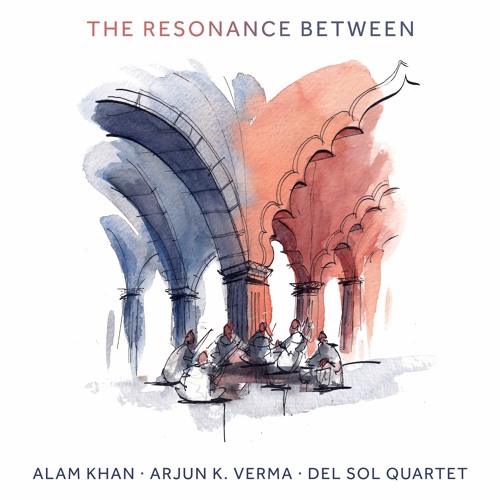by Alam Khan, Arjun K. Verma, Jack Perla, and Del Sol String Quartet
Album Available September 8, 2023 Through Six Degrees & AMMP
The Resonance Between is the new collaborative project of artists Alam Khan, Arjun K. Verma, and Del Sol Quartet — an ensemble of remarkably synergistic vision and virtuosity.
Despite their many aesthetic similarities, Indian classical and European classical music have rarely been combined, and generally have been done so in mere juxtapositions rather than with fluid integration. TRB presents a groundbreaking new level of fusion between these cultural genres, crafting a contemporary instrumental sound for this unique original work that is so much more than simply the sum of its parts.
Sarod master Khan and acclaimed sitarist Verma, expressing their lifelong search for identity within and across their Indian and Euro-American heritages, composed the work in collaboration with distinguished cross-cultural composer Jack Perla, deftly blending the resonant splendor of the Indian classical tradition with western classical sensibilities, artfully stirring Indian raga melodies into a subtle, contemporary mix.

Del Sol Quartet, led by violist Charlton Lee, takes a similarly innovative approach to music-making. A leading force in 21st-century chamber music, they step nimbly out of the European string quartet tradition to embrace a contemporary, cross-cultural ethos. On TRB their strings exquisitely complement the Indian instruments, lending an accessible familiarity to the cinematic soundscapes — stately and cerebral yet emotionally expressive, at times uplifting and bright while at others atmospheric and contemplative. Their playing marries diverse playing styles ranging from Indian classical solos and Beethoven-esque counterpoint to modern textural ambience. The music variously conveys movement and adventure, suspense and expectation, unfolding its palette of sound with both delicacy and great power.
Khan, Verma, and Del Sol Quartet are joined in the recording by some of the finest young tabla drummers in the world – Ojas Adhiya, Ishaan Ghosh, and Nilan Chaudhuri.
While highly original, TRB stands also as a fitting continuation of the majestic traditions of Indian classical music in the modern world. Alam Khan is the grandson of Allauddin Khan, the music legend who trained India’s 20th century music masters and cultural ambassadors Ali Akbar Khan and Ravi Shankar, both revered for their astonishing classical virtuosity as well as for their visionary east-west collaborations. He is the son of the deeply respected Ali Akbar Khan, with whom he studied and toured extensively, and at whose famed Ali Akbar College of Music in San Rafael he teaches advanced instrumental classes today. He tours worldwide, globally acknowledged as his father’s true creative heir and the face of a new generation of sarod players of the Maihar Gharana tradition.
Making this music was my way of honoring while attempting to further the innovations made by both my grandfather and father. Incorporating my sphere of musical influences and conceptual nature allowed for me to express that world between worlds,” says Khan. “As a mixed race multidisciplinary musician, creating from this world between worlds is my way of sharing my identity and unique upbringing both musically and culturally. It is of the utmost importance to convey this through my contemporary works.”
Arjun K. Verma, son of the esteemed sitarist Roop Verma, began studying sitar with his father at the age of five, and later went on to study with Ali Akbar Khan, in whose Maihar Gharana style of Hindustani classical music his playing is rooted. He has performed at the UN, on national television, and recorded with artists ranging from the London Symphony Orchestra to GRAMMY winner John Beasley. Verma and Khan’s extraordinary lineages laid the foundation for both the traditional rigor and the artistic innovation of the TRB project.
TRB is among the first-ever musical works expressly composed for the combination of sarod, sitar, violin, viola, cello, and tabla, with the six instruments weaving a seamless, elegant sound.
Verma comments, “So many cross-cultural projects with Indian instruments are rooted in other genres, so creating a contemporary album rooted in Indian classical music is really a dream come true. But, there was not much precedent for us to follow. Composing for string quartet along with Indian instruments opened up a lot of possibilities in terms of harmony and new textures, but at the same time challenged us to figure out how to make each instrument shine in its own right without being overshadowed by others. Ultimately I feel that we discovered a lot of new musical territory, and I’m excited to share this with the world.”
Composer Jack Perla has long been respected for his distinctive cross-fertilizations of jazz, improvisation, world influences, and classical music. Engineered, mixed, and mastered by Neil Godbole, the album artfully balances the sounds of these diverse instruments.
TRB also offers a single in the emerging Dolby Atmos format, mixed and mastered by Todd Boston. The song, Ascent, is one of the first Indian classical based tracks ever produced in the new technology of immersive audio that is taking the music world by storm. Verma continues, “Embracing this cutting-edge technology is indicative of the ethos behind the project: bridging the gap between traditional and modern, classical and contemporary.”
Six years in the making, TRB as a conceptual journey explores the many facets of human emotion that transcend race and culture, illuminating our commonalities despite our roots in different worlds. TRB’s intricately layered music moves through distinct chapters — reflecting stages of the composers’ own searches for what it means to belong to more than one culture — and expresses the struggle to attain a true sense of self.
In the end, no matter our ethnic or cultural backgrounds, we are all connected by the range of human emotions we share, and by the resonance of those emotions between us. This is the thread that ties us together and shapes our identity – The Resonance Between.
























































